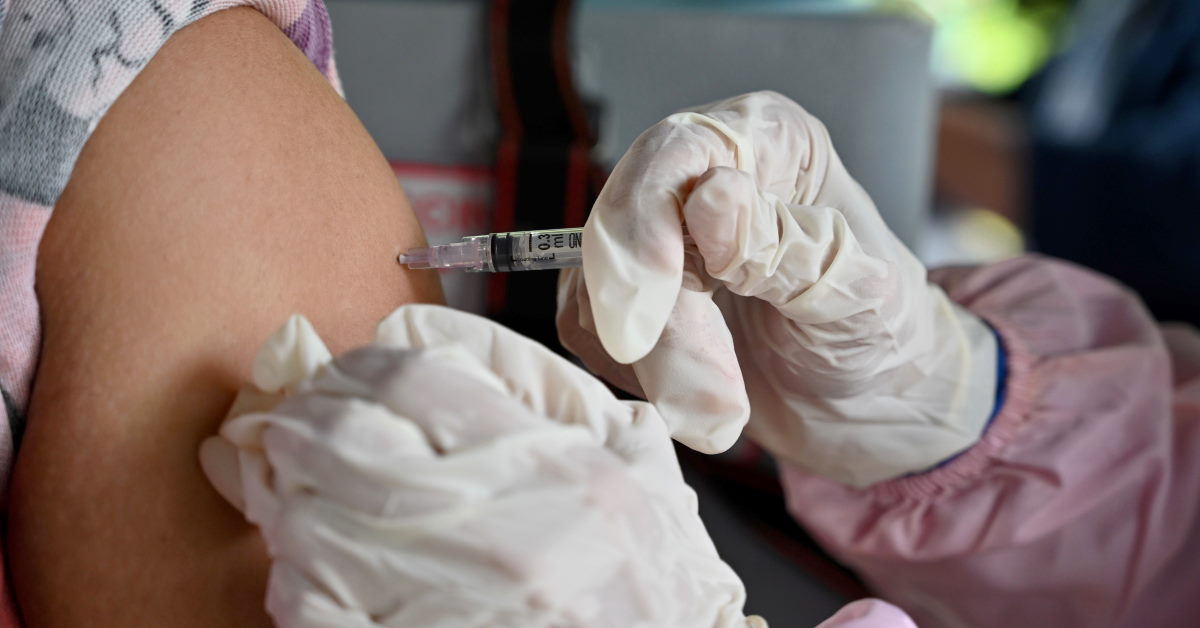COVID-19 vaccines provide significant extra protection for people who have already been infected, according to two new studies.
The jabs have proven highly effective in protecting those who have never had COVID, but their effectiveness at preventing symptoms and severe outcomes in people who have previously been infected has, until recently, been less clear.
Now two separate pieces of research, published in the Lancet Infectious Diseases journal, confirm that COVID-19 vaccines provide additional protection for people who have already been infected with Sars-CoV-2 – especially against severe disease.
In the first study, conducted in Brazil, researchers found that four vaccines – CoronaVac, Oxford/AstraZeneca, Janssen and Pfizer/BioNTech – provide extra protection against symptomatic reinfection and severe outcomes such as hospitalisation and death in people who had previously caught coronavirus.
The second study, from Sweden, found that vaccination against COVID-19 provided additional protection to those who had had COVID before, for at least nine months.
Together, the studies provide crucial data on vaccine effectiveness in people with a prior infection and underline the benefits of getting vaccinated regardless of whether someone has had COVID. Experts say the findings could also help inform global vaccine strategies.
“COVID-19 vaccines have been proven to be highly effective at preventing symptomatic infection and hospitalisation among those with no prior infection but effectiveness for those with prior infection is less clear,” said the author of the first study, Julio Croda, of Universidade Federal de Mato Grosso do Sul and Fundação.
“Understanding the duration and effectiveness of immunity for those vaccinated with a previous COVID-19 diagnosis becomes increasingly important as the pandemic progresses and surges … new cases may occur as a result of more transmissible variants.
Further research on the need for vaccination for those with a previous COVID-19 infection is a vital step to pandemic policy intervention including guidance on single dose or two dose vaccine protection.”
Benefits Outweigh Risks
In the first study, which involved more than 22,000 people who became reinfected with COVID, the data showed that being vaccinated reduced their risk of symptoms, being hospitalised or dying.
“All four of these vaccines have proven to provide significant extra protection for those with a previous COVID-19 infection, reducing hospitalisation and death,” said Croda. “There has been ongoing public debate about whether previously infected individuals need to be vaccinated.
Our results suggest that vaccine benefits far outweigh any potential risk and support the case for vaccination, including the full vaccine series, among individuals with prior Sars-CoV-2 infection.”
Writing in the same journal, Pramod Kumar Garg, of the Translational Health Science and Technology Institute, India, who was not involved in the study, said: “The results of [the Brazil] study and other recent studies challenge the concept of population-level herd immunity through natural infection alone against Sars-CoV-2 and suggest that vaccinating individuals who were previously infected provides further protection, particularly against severe disease. These data should help guide policy decisions and mitigate vaccine hesitancy among people who had Sars-CoV-2 infection.”
The second study, involving almost three million people, found that one vaccine dose in someone with infection-driven immunity from a previous infection lowered their risk of reinfection by 58 percent two months after the jab. Two doses of vaccine lowered the risk of infection by 66 percent.
The authors acknowledged limitations with both studies, including a risk of bias due to the observational nature of the research. Additionally, neither study included an analysis of reinfection from the Omicron variants.
Writing in the same journal, Jennifer Juno, of the University of Melbourne, Australia, who was not involved in either study, said: “These data confirm, in a large cohort, the added protective benefit of vaccination among individuals recovered from COVID-19.”
